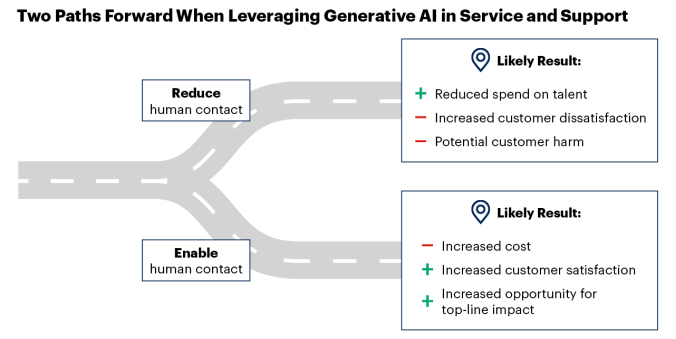Gartner’s latest report has made a bleak prediction for artificial intelligence within the customer service sector.
As the role of AI continues to dominate contact center discussions, organizations have been warned against pursuing digital-only solutions, with Gartner anticipating that the EU could make “the right to talk to a human” a part of its consumer protection laws within the next three years.
This comes in response to the rapid growth and importance of GenAI. With more customer service agent roles becoming automated, Gartner foresees that by as soon as 2027, 30% of organizations will have consolidated multiple positions into one customer-facing employee role.
By 2027, 30% of organizations will have consolidated multiple positions into one customer-facing employee role.
The consequence of this is clear for all to see: more AI = less humans.
And, like all great cyber-dystopian stories, those humans who haven’t been replaced by machines end up turning against each other. A point highlighted by Emily Potosky, Senior Director of Research in the Gartner Customer Service and Support practice:
“Service and support leaders must move fast in order to maintain their influence and avoid their function being subsumed by another.”
And here lies the crux of the issue. While AI’s efficiency and cost-cutting benefits cannot be ignored, when it comes to the customers themselves, many would still rather speak to a human.
It’s like when a friend recommends a TV series for you to watch. They outline why you should watch it, making a completely compelling argument as to how it suits your tastes and how much you’re bound to enjoy it (I’m looking at you, The Sopranos) – but for whatever reason, you simply don’t want to and would rather rewatch a tried and tested favorite.
Human agents are the tried and tested. And organizations that refuse to provide customers with an easily accessible option to contact an agent are facing an ever-growing backlash that could well result in the introduction of legal requirements.
In outlining the possibility of the EU taking legislative action, Potosky commented:
“The EU has a reputation as a standard-setter when it comes to consumer protection. If it takes this step, organizations that rely too heavily on generative AI-assisted service could need to scramble to boost their assisted-service offering, despite many leaders currently promoting the cost-savings of a digital–only strategy.”
So, how can organizations maximize the advantages of GenAI while still providing customers with the human touch that they crave and avoiding the EU’s wrath?
The Best of Both Worlds
AI is inescapable. Even the biggest of technophobes would be silly not to utilize at least some form of automation within their customer service offerings.
However, striking the right balance of precisely what, where, and how much AI to incorporate is what will separate the good from the great, and protect against any future regulations.
For Gartner, the best use is a tandem approach that sees AI supporting existing agents rather than replacing them. The report argues that as things currently stand, “it is too risky, expensive, and difficult to replace customer service reps with a generative-AI-powered chatbot.” But does concede that many organizations will still see this as a viable option, particularly moving forward.
The below image provides a basic outline of the pros and cons of both of these approaches:

Arguably the most striking and worrying prediction from the image is the suggestion that a reduction in human agents could lead to customers being harmed.
A reduction in human agents could lead to customers being harmed.
In expounding on this point, the report argues that a rush to implement customer-facing GenAI will lead to inadequately vetted systems that could make inaccurate and potentially dangerous recommendations.
With the stakes being raised from shoddy customer service to customers possibly being in danger, it is no surprise that Gartner is predicting legislative action.
For organizations that are contemplating a digital-only approach, the argument should not revolve around whether or not they will be in breach of future regulations, but should instead focus on what is best for the customer.
Whether that be providing the option of a customer’s preferred method of contact or protecting them against a technology that is still in its infancy, having human agents should be a non-negotiable.







